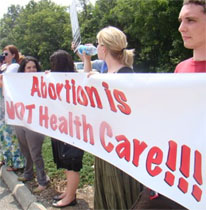August 1 was a sad day for American freedom of conscience as the Obama administration rolled out its HHS mandate forcing employers to provide insurance coverage of abortion-inducing drugs, regardless of an employer’s beliefs and principles. Still, with dozens of cases in federal courts challenging this mandate, there is still hope that it will be rejected by the courts under either the First Amendment or the Religious Freedom Restoration Act.
On July 27, we had a tantalizing glimpse of such an outcome when a federal district court in Colorado, in Newland v. Sebelius, issued a preliminary injunction against the mandate. Of course, as the name indicates, it is only a “preliminary” injunction—it is not a final judgment on the unconstitutionality of the mandate), but it is an important first step in that direction.
 Even so, Newland is not the only recent case where courts have protected conscience rights; there have been victories on issues other than the mandate as well.
Even so, Newland is not the only recent case where courts have protected conscience rights; there have been victories on issues other than the mandate as well.
For instance, in February, a district court in Washington dealt a stunning blow to those eager to use state law to deny conscience rights. In Stormans v. Selecky, a federal district court struck down the Washington Board of Pharmacy’s regulations forcing all pharmacists—whether they object or not—to dispense abortion-inducing drugs (“emergency contraception” or “Plan B”).
The court found that the Board’s regulations were aimed at conscientious objectors from their inception; that the goal of the Board, Governor Christine Gregoire, and “advocacy groups” was to eliminate conscientious objection; that “literally all of the evidence demonstrate[d] that the 2007 rulemaking was undertaken primarily (if not solely) to ensure that religious objectors would be required to stock and dispense Plan B”; and that the design of the regulations was to accomplish a “religious gerrymander.”
In addition, the court held that “the evidence at trial revealed no problem of access to Plan B….” In fact, a Board-commissioned a survey “confirm[ed] that Plan B is widely available, and religious objections do not pose a barrier to access.” This was the case even in rural areas, and the court acknowledged that many stories regarding hampered access were manufactured by activists. The district court concluded that the regulations violate the First (free exercise) and Fourteenth (equal protection) Amendments of the U.S. Constitution.
Similarly, a challenge to the 2005 Illinois rule requiring pharmacists to dispense abortion-inducing drugs is currently before a state appellate court in Morr-Fitz v. Quinn. In April 2011, a state trial court held that the Illinois rule violated the Illinois Religious Freedom Restoration Act, the Illinois Healthcare Rights of Conscience Act, and the Free Exercise Clause of the First Amendment. Moreover, the court stated that it “heard no evidence of a single person who ever was unable to obtain emergency contraception because of a religious objection.”
CLICK LIKE IF YOU’RE PRO-LIFE!
Interestingly, the outcomes in these non-HHS mandate cases bode well for the plaintiffs challenging the HHS mandate. If pharmacists cannot be forced to dispense abortion-inducing drugs, then employers should not be forced to pay for them.
Taken together, these cases give hope to Americans fearing for the loss of their freedom of conscience; at least some courts are getting it right and are making common sense decisions supporting our basic First Amendment rights.







